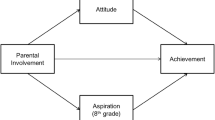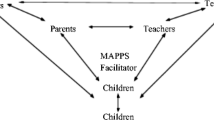Abstract
This study investigates the roles parents in the United States of America and parents in the People’s Republic of China play in their children’s mathematics learning. It also examines the relationship between parental involvement and students’ mathematical problem-solving performance. In the study, 232 US sixth-grade students and 310 Chinese sixth-grade students along with their parents were surveyed. The results of this study support the argument, from a broader cross-national perspective, that parental involvement is a statistically significant predictor of their children’s mathematics achievement. Cross-nationally, Chinese parents seemed to play a more positive role than do the US parents.
Similar content being viewed by others
References
Anderson, A. (1997). Families and mathematics: A study of parent-child interactions.Journal for Research in Mathematics Education, 28, 484–511.
Ascher, C. (1988). Improving the school-home connection for poor and minority urban students.Urban Review, 20, 109–123.
Baumrind, D. (1971). Current patterns of parental authority.Developmental Psychology Monographs, 4 (1, Pt 2).
Berry, J. W., Poortinga, Y. H., Segall, M. H., & Dasen, P. R. (1992).Cross-cultural psychology: Research and applications. Cambridge, MA: Cambridge University Press.
Berger, E. H. (1991). Parent involvement: Yesterday and today.The Elementary School Journal, 91, 209–219.
Booth, A., & Dunn, J. F. (1996).Family-school links: How do they affect educational outcomes? Hillsdale, NJ: Erlbaum.
Cai, J. (1995). A cognitive analysis of US and Chinese students’ mathematical performance on tasks involving computation, simple problem solving, and complex problem solving.Journal for Research in Mathematics Education Monographs Series, 7, Reston, VA: National Council of Teachers of Mathematics.
Cai, J. (2000). Mathematical thinking involved in US and Chinese students’ solving process-constrained and process-open problems.Mathematical Thinking and Learning: An International Journal, 2, 309–340.
Cai, J. (2001). Improving mathematics learning: Lessons from cross-national studies of US and Chinese students.Phi Delta Kappan, 82, 400–405.
Cai, J., Moyer, J. C., Wang, N. (1999). Parental roles in students’ learning of mathematics: An exploratory study.Research in Middle Level Education Quarterly, 22, 1–18.
Chao, R. K., & Sue, S. (1996). Chinese parental influence and their children’s school success: A paradox in the literature on parenting styles. In S. Lau (Ed.),Growing up the Chinese way: Chinese child and adolescent development (pp. 93–120). Hong Kong, The Chinese University Press.
Eccles, J. S., Arbreton, A., Buchanan, C. M., Jacobs, J., Flanagan, C., Harold, et al. (1993). School and family effects on the ontogeny of children’s interests, self-perceptions, and activity choices. In J. Jacobs (Ed.),Nebraska Symposium on Motivation: Vol.40. Developmental perspectives on motivation (pp. 145–208). Lincoln: The University of Nebraska Press.
Eccles, J. S., & Harold, R. D. (1993). Parent-school involvement during the early adolescent years.Teachers College Record, 94, 568–587.
Epstein, J. S. (1986). Parents’ reactions to teacher practices of parent involvement.The Elementary School Journal, 86, 277–294.
Greeno, J. G., Collins, A. M., & Resnick, L. B. (1996). Cognition and learning. In D. Berliner & R. Calfree (Eds.),Handbook of educational psychology (pp. 15–46). New York: Macmillan.
Haynes, N. M., & Ben-Avie, M. (1996). Parents as full partners in education. In A. Booth & J. F. Dunn (Eds.),Family-school links: How do they affect educational outcomes? (pp. 45–55). Hillsdale, NJ: Erlbaum.
Hoover-Dempsey, K. V., & Sandler, H. M. (1995). Parental involvement in children’s education: Why does it make a difference?Teachers College Record, 97, 310–331.
Hoover-Dempsey, K. V., Bassler, O. C., & Burow, R. (1995). Parents’ reported involvement in students’ homework: Strategies and practice.The Elementary School Journal, 95, 435–450.
Henderson, A. T. (1987).The evidence continues to grow: Parent involvement improves student achievement. Columbia, MD: National Committee for Citizens in Education.
Jacobs, J. (Ed.) (1992).Nebraska Symposium on Motivation: Vol. 40. Developmental perspectives on motivation. Lincoln: The University of Nebraska Press.
Lau, S. (1996).Growing up the Chinese way: Chinese child and adolescent development. Hong Kong: The Chinese University Press.
Leder, G. (1992). Mathematics before formal schooling.Educational Studies in Mathematics, 23, 386–396.
Lapointe, A. E., Mead, N. A., & Askew, J. M. (1992).Learning mathematics. Princeton, NJ: Educational Testing Service.
Lopez, G. R., Scribner, J. D., & Mahitivanichcha, K. (2001). Redefining parental involvement: Lessons from high-performing migrant-impacted schools.American Educational Research Journal, 38, 253–288.
Ma, L. (1999).Knowing and teaching elementary mathematics: Teachers’ understanding of fundamental mathematics in China and the United States. Hillsdale, NJ: Erlbaum.
Mayer, R. E. (1987).Educational psychology: A cognitive approach. Boston: Little & Brown.
Mayer, R. E., Tajika, H., & Stanley, C. (1991). Mathematical problem solving in Japan and the United States: A controlled comparison.Journal of Educational Psychology, 83, 69–72.
Merttens, R., & Vass, J. (Eds.) (1993).Partnerships in maths: Parents and schools-the IMPACT project. London, UK: Falmer.
Price, J. (1997). President’s report: Building bridges of mathematical understanding for all children.Journal for Research in Mathematics Education, 27, 603–608.
Robitaille, D. F., & Garden, R. A. (1989).The IEA study of mathematics II: Contexts and outcomes of school mathematics. New York: Pergamon.
Sarason, S. B. (1995).Parental involvement and the political principle. San Franscico: Jossey-Bass.
Schneider, B., & Lee, Y. (1990). A model for academic success: The school and home environment of East Asian students.Anthropology and Education Quarterly, 21, 358–377.
Sigel, I. E., McGillicuddy-DeLisi, A. V., & Goodnow, J. J. (Eds.). (1992).Parental belief systems: The psychological consequences for children. Hillsdale, NJ: Erlbaum.
Silver, E. A., & Lane, S. (1993). Assessment in the context of mathematics instruction reform: The design of assessment in the QUASAR project. In M. Niss (Ed.),Assessment in mathematics education and its effects (pp. 59–70). London: Kluwer.
Siu, S-F. (1994). Taking no chances: A profile of a Chinese-American family’s support for school success.Equity and Choice, 10, 23–32.
Steinberg, L, Dornbusch, S., & Brown, B. (1992). Ethnic differences in adolescent achievement: An ecological perspective.American Psychologist, 47, 723–729.
Steinberg, L., Mounts, N., Lamborn, S., & Dornbusch, S. (1991). Authoritative parenting and adolescent adjustment across varied ecological niches.Journal of Research on Adolescence, 1, 19–36.
Stevenson, H.W., & Lee, S. (1990).Contexts of achievement: A study of American, Chinese, and Japanese children. Chicago: University of Chicago Press.
Stevenson, H. W. Lee, S., Chen, C., Lummis, M., Stigler, J. W., Liu, F., & Fang, G. (1990). Mathematics achievement of children in China and the United States.Child Development, 61, 1053–1066.
Stigler, J. W., & Hiebert, J. (1999).The Teaching gap: Best ideas from the world’s teachers for improving education in the classroom. New York: The Free Press.
Stigler J. W., Lee, S., & Stevenson, H. W. (1990).Mathematical knowledge of Japanese, Chinese, and American elementary school children. Reston, VA: NCTM.
Sue, S., & Okazaki, S. (1990). Asian-American educational achievements: A phenomenon in search of an explanation.American Psychologiest, 45, 913–920.
Wang, M. C., Haertel, G. D., & Walberg, H. J. (1993). Toward a knowledge base for school learning.Review of Educational Research, 63, 249–294.
Watkins, D. A., & Biggs, J. B. (1996).The Chinese learner: Cultural, psychological, and contextual influences. Hong Kong/Melbourne: The Comparative Education Research Centre of the University of Hong Kong and the Australian Council for Educational Research.
Weston, W. J. (Ed.). (1989).Education and the American family. New York: New York University Press.
White, K. R., Taylor, M. J., & Moss, V. D. (1993). Does research support claims about the benefits of involving parents in early intervention programs?Review of Educational Research, 62, 91–125.
Young-Loveridge, J. (1989). The relationship between children’s home experiences and their mathematical skills on entry to school.Early Child Development and Care, 43, 43–59.
Author information
Authors and Affiliations
Rights and permissions
About this article
Cite this article
Cai, J. Investigating parental roles in students’ learning of mathematics from a cross-national perspective. Math Ed Res J 15, 87–106 (2003). https://doi.org/10.1007/BF03217372
Issue Date:
DOI: https://doi.org/10.1007/BF03217372




